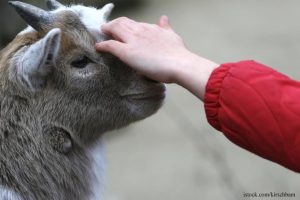The Cleveland County Fair Working Group held a press conference this week to give their recommendations on how to make the event safer. Last year’s outbreak of E. coli O157:H7 at the Fair sickened more than 100 people; seven people developed hemolytic uremic syndrome. A toddler died as a result of the infection. In early May, a task force recommended that there be no petting zoo at the fair at all.
 The goal of the Group was to review prevention measures that were in place during that outbreak and to identify measures to help mitigate the risk of disease transmission. The Group did not recommend that petting zoos or animal contact exhibits be banned at the fair.
The goal of the Group was to review prevention measures that were in place during that outbreak and to identify measures to help mitigate the risk of disease transmission. The Group did not recommend that petting zoos or animal contact exhibits be banned at the fair.
They stated that animal contact exhibits at sanctioned agricultural fairs must adhere to the requirements set forth in Aedin’s Law. The law, passed in 2005, set stricter sanitation requirements for petting zoos. It was written in response to the 2004 E. coli outbreak at the North Carolina State fair that sickened 108 people. Petting zoos must be inspected and permitted by the state Agriculture Department as a result of that law. There was an E. coli outbreak at the 2011 North Carolina State Fair as well and another in 2006.
The recommendations are: provide a clear separation between all food vending and animal exhibits and entertainment. Provide marked entranceways into the animal exhibit by providing barriers and gates, with signage telling patrons they are entering animal exhibit areas. Provide hand washing stations at entrances and exits of the exhibit areas so people will be encouraged to wash their hands. All food vendors should provide pre-packaged, pre-portioned condiments to avoid the communal hand pump devices for ketchup and mustard.
And this was perhaps the most significant recommendation: that this signage should be posted at the fair entrances and in animal exhibit areas: “Under North Carolina law, there is no liability for an injury to or death of a participant in an agritourism activity conducted at this agritourism location if such injury or death results from the inherent risks of the agritourism activity. Inherent risks of agritourism activities include, among others, risks of injury inherent to land, equipment, and animals, as well as the potential for you to act in a negligent manner that may contribute to your injury or death. The transmission of bacteria such as E. coli O157:H7 from animals on this site is an inherent risk of this agritourism event. You are assuming the risk of participating in this agritourism activity.”




